There is a unique relation between all organs in the human body. They always go through the central leadership of the brain who directs them to act in a certain way and react in a certain way to an external stimulus. This is the standard procedure and in existence since mankind itself.
But two organs have turned out to be breaching this protocol for the last few years. Some outsiders (Social media avenues like Facebook, Twitter, Whatsapp etc.) have motivated them. These controversial organs in cahoots with each other are:
Ears
Tongue
What they have done is, they have become hand in glove with each other and skipped the intermediate link of involving the brain. So ears listen and tongue reacts instantly. Read a tweet, react. Read a post, react. Read a message, react. And react FAST. This is the new chaos called social media.
I remember, earlier days, if some people were fighting outside the railway station, suddenly a crowd would appear and in 7-8 minutes, all were giving “solutions” and in 11-12 minutes all were fighting with each other.
Same thing is happening, but not necessarily outside the rail station.
Now the point i want to make is: This rhetoric, which is aggravated by the noise around it, is about GST legislation in India. Suddenly, everyone and his uncle think that this will be very good for the logistics sector.
I will speak for our sector only in context of GST. The buzz is:
• Due to a “One Nation, One Tax “theory, all indirect taxes will be subsumed and therefore there will be ease of operations and flow of goods and services.
Remember – one nation one tax is a good theory but look within and see the difference of opinion and chaos within your own house, office, society, club, village, town. Accounts department doesn’t agree with marketing teams so how will centre and state agree and work without chaos is to be seen to be believed.
• Since goods and services will flow freely, a unified National Logistics policy will come in leading to organisation of the industry.
All i have seen in my observation of industry is that whenever a “policy “or “ organised “sector is tried to be created, the small, middle, tertiary level players get exhausted and only the large fish remain. If this is good or bad, you decide but I think it is necessary to have industry at every level of operation, especially in a country like India, where entrepreneurs are at each level.
• Then due to this policy, 100% FDI in warehousing will be possible, 3PL and 4 PL will get a boost with the entry of multinationals etc. Look, the listed players who are ready for it will benefit. But the industry as a whole will be further cornered and narrowed.
Also, never forget that FDI is just a policy. It doesn’t guarantee FDI. Look at the real estate prices on which warehouses are built which are higher than London, New York, Tokyo and I doubt if anyone will want to pay a price for it, knowing very well that the final pricing power of warehouses to customers is nil.
That brings me to a larger point:
GST is only a tax situation. Tax alone is not the Business. If the Business is there, tax comes in the picture. There are four constant players in any business:
• Shareholders – Real owner
• Managements and Employees – executors
• Tax – government
• Customers – consumers
This doesn’t change. What changes is that according to the macro and micro dynamics of that industry, the share of revenue is distributed. Let me illustrate with an example:
Let’s say in Logistics: The denominant is INR 100. The year is 2016. The Base year is 2001.
Customers benefit the most because of no pricing power. So they have almost 45 bucks of this 100 – which in 2001 would be 15 since there was no competition and logistics companies had pricing power.
Management & Employee costs have escalated over the decade so as of today; they corner 35 bucks which was 5 bucks in 2001.
Tax: new taxes like service tax have come in and direct taxes have also gone up so this corners 15 of that 100 today which was 10 in 2001.
What remains is Shareholders or Owners who have the balance 5 out of the 100 today. I am not just saying. The Net Profit After tax component of the large listed players in India and around the world is in low single digits like 5%. This in 2001 was 70 if you do the reverse math.
These 70 out of 100 enabled them to buy offices, land, warehouses, equipment etc. and the asset prices appreciated over the years. Ask a promoter today to invest 150 crores for a warehouse and then hunt for business without pricing power on the back of discounts and he will rather do nothing than hit himself on his own toe.
So what is needed?
A business situation in logistics needs to change. Pricing power needs to come in which i don’t see coming anytime soon, maybe never. It looks like the best is behind us. On immediate basis, that business situation is GRI (General Rate Increase)
That happens when demand picks up and supply can’t catch up and the business situation changes for the better. Everyone makes better profits when prices are higher. You may argue that LCL rates never go up but see your own P&L statements over the years and realise that when the prices were higher, the going was the best.
So to my mind, a business situation needs to better, not a tax situation like GST.
GRI as of now is much anticipated than GST.
But you won’t listen to me because print, digital, broadcast and social media are all shouting: GST best for Logistics. All stocks have run up in anticipation. Companies in the business of Market Cap, congratulations. You can do one thing for me at least: You don’t breach the brain in this sinful partnership of the ears and tongue.
Like!

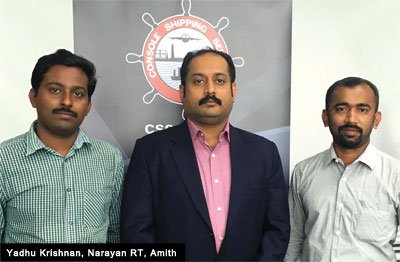 In a landmark move CSS Group opens its office in Doha and announces its Qatar services. Console Shipping Services W.L.L, as the brand being known in Qatar, offers end to end shipping and logistics solutions with its own infrastructure and a pool of trained manpower. Being a part of the renowned CSS Group, gives CSS Qatar an edge to all its operations and leverage amongst the leaders, with a wide network of partners globally. CSS Qatar ensures that world class services will be offered on all segments of its operations.
In a landmark move CSS Group opens its office in Doha and announces its Qatar services. Console Shipping Services W.L.L, as the brand being known in Qatar, offers end to end shipping and logistics solutions with its own infrastructure and a pool of trained manpower. Being a part of the renowned CSS Group, gives CSS Qatar an edge to all its operations and leverage amongst the leaders, with a wide network of partners globally. CSS Qatar ensures that world class services will be offered on all segments of its operations.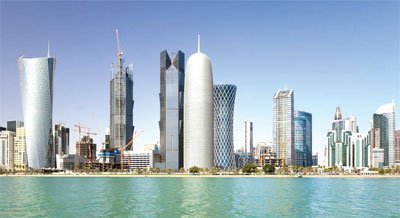 Transport upgrades are leading construction industry growth in Qatar, following rapid expansion and billions of dollars’ worth of new contracts awarded in recent years. The 2022 FIFA World Cup has created an impetus to finish a number of critical transport projects on time, including thousands of kilometers of road and expressway upgrades and construction, the new Hamad Port and a major three-part rail programme. Expansion of the recently opened Hamad International Airport (HIA) also advanced in 2015 when authorities released detailed designs for the next phase of construction, which will nearly double existing capacity – a welcome upgrade, given that the airport is already operating above capacity. Under the broader Qatar National Vision 2030 (QNV 2030) development plan, these projects will pave the way for future growth across all sectors of the economy, reducing bottlenecks and traffic congestion, improving trade and investment opportunities, and supporting ongoing efforts to diversify the economy.
Transport upgrades are leading construction industry growth in Qatar, following rapid expansion and billions of dollars’ worth of new contracts awarded in recent years. The 2022 FIFA World Cup has created an impetus to finish a number of critical transport projects on time, including thousands of kilometers of road and expressway upgrades and construction, the new Hamad Port and a major three-part rail programme. Expansion of the recently opened Hamad International Airport (HIA) also advanced in 2015 when authorities released detailed designs for the next phase of construction, which will nearly double existing capacity – a welcome upgrade, given that the airport is already operating above capacity. Under the broader Qatar National Vision 2030 (QNV 2030) development plan, these projects will pave the way for future growth across all sectors of the economy, reducing bottlenecks and traffic congestion, improving trade and investment opportunities, and supporting ongoing efforts to diversify the economy.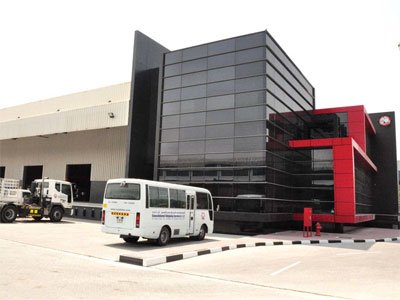 CSS Facility will soon be functional in Jebel Ali. The new administrative and additional warehouse facility will increase the existing operational area to a great extent. The administrative block will be the Regional Head Quarters of the Company. Adjacent to the existing office building and the CFS, the new facility will increase the storage capacity of CSS, which in-turn will benefit the ever growing demand for warehousing facility inside JAFZA. Once commissioned, the new infrastructure will bring in an additional 47,850 Sq. Ft to CSS Group’s existing 3 PL facilities in the Middle East. The new facility will have double deep racking facility. The storage area will have state of the art facilities.
CSS Facility will soon be functional in Jebel Ali. The new administrative and additional warehouse facility will increase the existing operational area to a great extent. The administrative block will be the Regional Head Quarters of the Company. Adjacent to the existing office building and the CFS, the new facility will increase the storage capacity of CSS, which in-turn will benefit the ever growing demand for warehousing facility inside JAFZA. Once commissioned, the new infrastructure will bring in an additional 47,850 Sq. Ft to CSS Group’s existing 3 PL facilities in the Middle East. The new facility will have double deep racking facility. The storage area will have state of the art facilities.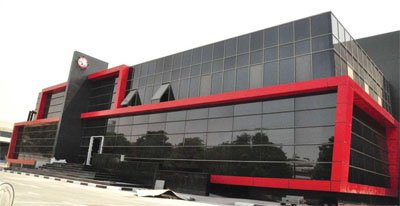
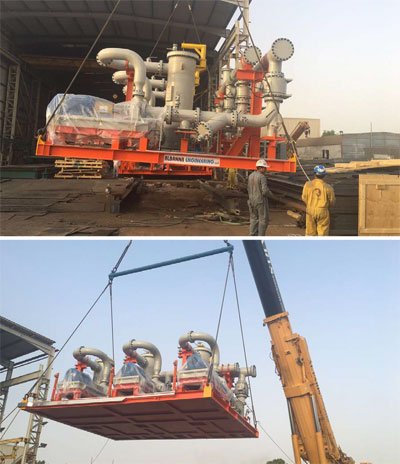 CSS Sales Jebel Ali team has done a movement from Al Quoz to Dry Dock for a FPSO project. One cooling water circulation Pump Skid was the machinery. The skid weighing 53 tons with a volume of 291.43 CBM was handled by a well-trained team of CSS. As is the practice, extensive study and survey was conducted as part of this movement regarding the Origin, destination and the travel route. Each point of the entire project was carefully assessed to ensure a fool proof and smooth journey of the cargo. Dimensions of the Skid was 9.2 x 7.2 x 4.4 meters (L x W x H). Loading and transportation was the scope of work for CSS. Superlift cranes weighing 500 tons were engaged for the process.
CSS Sales Jebel Ali team has done a movement from Al Quoz to Dry Dock for a FPSO project. One cooling water circulation Pump Skid was the machinery. The skid weighing 53 tons with a volume of 291.43 CBM was handled by a well-trained team of CSS. As is the practice, extensive study and survey was conducted as part of this movement regarding the Origin, destination and the travel route. Each point of the entire project was carefully assessed to ensure a fool proof and smooth journey of the cargo. Dimensions of the Skid was 9.2 x 7.2 x 4.4 meters (L x W x H). Loading and transportation was the scope of work for CSS. Superlift cranes weighing 500 tons were engaged for the process. The most able shipbuilders of ancient times were those of Phoenicia, about 2000 BC, who constructed not only merchant vessels capable of carrying large cargoes, but also warships larger and more effective than any built by their contemporaries, the Egyptians and the Aegeans. The Phoenicians’ most significant contribution was the round boat—a broad-beamed ship that depended principally on sails rather than oars and provided a much larger cargo-space than the narrow galleys. Phoenician round ships travelled the Mediterranean and beyond: to Britain (for trade in tin), and probably far south along the African coast.
The most able shipbuilders of ancient times were those of Phoenicia, about 2000 BC, who constructed not only merchant vessels capable of carrying large cargoes, but also warships larger and more effective than any built by their contemporaries, the Egyptians and the Aegeans. The Phoenicians’ most significant contribution was the round boat—a broad-beamed ship that depended principally on sails rather than oars and provided a much larger cargo-space than the narrow galleys. Phoenician round ships travelled the Mediterranean and beyond: to Britain (for trade in tin), and probably far south along the African coast. CSS Group proudly announces its commencement of services from Oman with the brand known as Comprehensive Consolidated Trade and Shipping L.L.C. Being a part of the CSS Group, gives CCTS Oman access to an impressive network of global partners which leads them to all corners of the world. CCTS Oman ensures that world class services being offered on all segments of its operations with a touch of professionalism. CSS Group has recently completed two decades of service in the Middle East recently. CSS, is already present at Sohar with their association with the Arkan Sohar group.
CSS Group proudly announces its commencement of services from Oman with the brand known as Comprehensive Consolidated Trade and Shipping L.L.C. Being a part of the CSS Group, gives CCTS Oman access to an impressive network of global partners which leads them to all corners of the world. CCTS Oman ensures that world class services being offered on all segments of its operations with a touch of professionalism. CSS Group has recently completed two decades of service in the Middle East recently. CSS, is already present at Sohar with their association with the Arkan Sohar group. Oman continues to capitalise on its geographical position, increasingly establishing itself as a major transshipment centre for traffic between Europe, Africa and Asia with ongoing development and expansion plans at various ports in the sultanate, particularly at Duqm where a new port and dry-dock are being developed. Coordinating this maritime-based growth with land and air-side growth is also under way, with the 2011-15 five-year development plan earmarking $15.5bn for the national rail project; $6.2bn for airport expansion; and $3.1bn for road network development. Plans to connect the national railway project with the GCC-wide rail network will boost integration in the region, while airport and road expansions will solidify Oman’s growing reputation as a logistics hub and encourage the sultanate’s growing tourism sector.
Oman continues to capitalise on its geographical position, increasingly establishing itself as a major transshipment centre for traffic between Europe, Africa and Asia with ongoing development and expansion plans at various ports in the sultanate, particularly at Duqm where a new port and dry-dock are being developed. Coordinating this maritime-based growth with land and air-side growth is also under way, with the 2011-15 five-year development plan earmarking $15.5bn for the national rail project; $6.2bn for airport expansion; and $3.1bn for road network development. Plans to connect the national railway project with the GCC-wide rail network will boost integration in the region, while airport and road expansions will solidify Oman’s growing reputation as a logistics hub and encourage the sultanate’s growing tourism sector. In fact, 44 percent of those young people say they plan to pull up stakes within the next year, according to rent increase.
In fact, 44 percent of those young people say they plan to pull up stakes within the next year, according to rent increase. CSS IT has migrated it’s ERP from I-Pack to FINS
CSS IT has migrated it’s ERP from I-Pack to FINS FINS takes pride in having novel features like browser compatibility, all format report generation, personalised screen colours and enhanced speed along with some other new features like calculator, improved memory management system and user friendly forms. FINS has the ability to offer you a one-stop-solution across many business related applications, such as Human Resources, Payroll, Finance & Fixed Assets, Construction, Warehousing & Distribution, and General Freight Forwarding.
FINS takes pride in having novel features like browser compatibility, all format report generation, personalised screen colours and enhanced speed along with some other new features like calculator, improved memory management system and user friendly forms. FINS has the ability to offer you a one-stop-solution across many business related applications, such as Human Resources, Payroll, Finance & Fixed Assets, Construction, Warehousing & Distribution, and General Freight Forwarding. Destination weddings are becoming the buzzword in the Indian Culture as well. Recently CSS got lucky to witness a destination wedding. T S Kaladharan, Chairman of CSS Group arranged her daughter’s wedding in the dream like, exotic destination of Phuket.
Destination weddings are becoming the buzzword in the Indian Culture as well. Recently CSS got lucky to witness a destination wedding. T S Kaladharan, Chairman of CSS Group arranged her daughter’s wedding in the dream like, exotic destination of Phuket.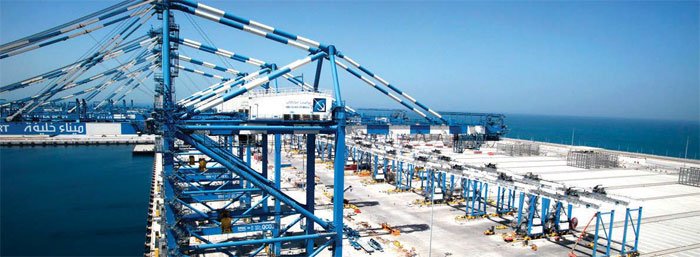
 The logistics industry in India is growing slowly but steadily, with introduction of E- commerce , Economic reformation by proposed GST , Initiative like “ MAKE IN INDIA”. Today we will see what positive & negative impacts can happen in Logistics Market for Modi Government’s proposed GST which will be implemented from 2017 calendar year….
The logistics industry in India is growing slowly but steadily, with introduction of E- commerce , Economic reformation by proposed GST , Initiative like “ MAKE IN INDIA”. Today we will see what positive & negative impacts can happen in Logistics Market for Modi Government’s proposed GST which will be implemented from 2017 calendar year….
 We all know that whether our office is lively, dull or easy-going we have days when things just do not seem to go right. At such times our stress levels rise and as a consequence our work suffers. Let’s face it we would all appreciate a less stressful day at the office. On such occasions an extra bit of ‘umph’ to jolly us along, would be very welcome. It’s therefore of little wonder that lots of ongoing research takes place to see how this ‘umph’ may be provided. So here are three suggestions, from many, that are designed to stimulate ideas which may enhance a work place environment.
We all know that whether our office is lively, dull or easy-going we have days when things just do not seem to go right. At such times our stress levels rise and as a consequence our work suffers. Let’s face it we would all appreciate a less stressful day at the office. On such occasions an extra bit of ‘umph’ to jolly us along, would be very welcome. It’s therefore of little wonder that lots of ongoing research takes place to see how this ‘umph’ may be provided. So here are three suggestions, from many, that are designed to stimulate ideas which may enhance a work place environment. A much talked about topic these days is the exit of Britain from the European Union (EU). The European Union is made up of 28 member states and on June 23rd 2016, the people of Britain voted for the exit of Britain (also referred as “BREXIT”) from the European Union, after being with EU for almost 43 years.Since the finality of the process of exiting the EU, will take about 2 year; this is the perfect time for individuals and companies engaged in the shipping industry to have a better understanding of the “Impact of BREXIT”.
A much talked about topic these days is the exit of Britain from the European Union (EU). The European Union is made up of 28 member states and on June 23rd 2016, the people of Britain voted for the exit of Britain (also referred as “BREXIT”) from the European Union, after being with EU for almost 43 years.Since the finality of the process of exiting the EU, will take about 2 year; this is the perfect time for individuals and companies engaged in the shipping industry to have a better understanding of the “Impact of BREXIT”. Further, the Contracts / Agreements have already been entered into by the Companies in the UK, with Companies in the European Union may now have to be amended. . For example, Shipping Contracts, that allow for trading within certain geographical areas in the EU, should now specifically define, if this area in the EU includes, the UK or not. Since the Contracts/Agreements are binding on the parties to it, there is a need to be vigilant while amending these Contracts/Agreements so as to avoid any confusion or ambiguity that would arise in the future.
Further, the Contracts / Agreements have already been entered into by the Companies in the UK, with Companies in the European Union may now have to be amended. . For example, Shipping Contracts, that allow for trading within certain geographical areas in the EU, should now specifically define, if this area in the EU includes, the UK or not. Since the Contracts/Agreements are binding on the parties to it, there is a need to be vigilant while amending these Contracts/Agreements so as to avoid any confusion or ambiguity that would arise in the future.